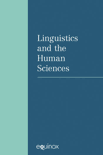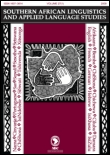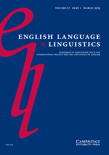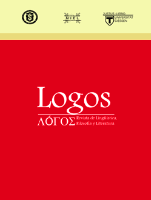
Linguistics and the Human Sciences
Scope & Guideline
Fostering Interdisciplinary Dialogues in Linguistic Scholarship
Introduction
Aims and Scopes
- Interdisciplinary Approach to Language:
The journal adopts an interdisciplinary perspective, integrating insights from linguistics, education, sociology, and cultural studies to explore how language shapes and is shaped by human experiences. - Focus on Systemic Functional Linguistics (SFL):
A significant emphasis is placed on Systemic Functional Linguistics, particularly its applications in translation studies, education, and discourse analysis, highlighting its relevance in understanding meaning-making processes. - Pedagogical Applications of Linguistics:
Research often addresses pedagogical methodologies, particularly in science education, examining how language can facilitate learning and comprehension across disciplines. - Cultural and Identity Studies:
The journal explores language as a vehicle for identity construction and cultural representation, particularly in multilingual and multicultural contexts. - Textual Analysis and Discourse Studies:
A core area of focus is on textual analysis and discourse studies, investigating the ways language functions in various texts, from educational materials to filmic discourse.
Trending and Emerging
- Intermodal Pedagogy:
There is an increasing interest in intermodal pedagogy, particularly in educational settings. This trend emphasizes the integration of multiple modes of communication, such as visual and verbal, to enhance learning outcomes. - Ecolinguistics and Language Ecology:
Emerging themes in ecolinguistics indicate a growing concern for environmental issues and the relationship between language and ecological contexts, promoting a harmonious interaction between language, culture, and the environment. - Cross-Cultural Communication and Identity:
Research is increasingly addressing the complexities of cross-cultural communication and identity formation, reflecting the globalized nature of contemporary society and the importance of understanding diverse linguistic experiences. - Quantitative Methods in Linguistic Research:
There is a rising trend in employing quantitative methods, including multivariate statistics, to analyze linguistic phenomena, indicating a shift towards more empirical and data-driven approaches in linguistics. - Translation Studies as a Cross-Disciplinary Field:
The integration of translation studies with systemic functional linguistics is gaining momentum, showcasing the relevance of linguistic frameworks in understanding translation practices and their implications for communication across languages.
Declining or Waning
- Traditional Linguistic Theory:
There is a noticeable decline in papers that focus solely on traditional linguistic theories without connecting them to contemporary issues or applied contexts. This shift suggests a move towards more practical applications of linguistic research. - General Language Studies:
Research that broadly examines language without a specific focus on its social implications or applications has become less frequent, indicating a trend towards more specialized and contextualized studies. - Static Language Models:
Papers relying on static models of language analysis, without incorporating dynamic or interactive perspectives, appear to be waning. This reflects a growing emphasis on the fluidity of language in real-world interactions.
Similar Journals

Revista da Anpoll
Pioneering discussions that shape the future of Letters and Linguistics.Revista da Anpoll is a prestigious academic journal dedicated to the fields of Letters and Linguistics, published by the ASSOC NAC POS-GRADUACAO PESQUISA LETRAS & LINGUISTICA in Brasilia, Brazil. Since its inception in 1994, this Open Access journal has aimed to foster scholarly communication and lead discourse in the linguistic and literary disciplines, allowing researchers and practitioners free access to cutting-edge research and findings. Although it does not currently have an H-index, the journal continues to attract high-quality submissions from experts in its field, contributing to the global academic community. By offering a platform for innovative studies and discussions, Revista da Anpoll plays a critical role in advancing knowledge and practice within linguistics and literary studies, making it an invaluable resource for academics, professionals, and students alike.

Cognitive Studies-Etudes Cognitives
Unlocking the Complexity of Language and ThoughtCognitive Studies-Etudes Cognitives, published by the Polish Academy of Sciences, Institute of Slavic Studies, is a prominent open-access journal based in Poland, dedicated to advancing research in the interdisciplinary fields of cognitive studies, communication, and linguistics. Since its inception, the journal has made a significant impact in the academic community, evidenced by its ranking in the Scopus database within the top 30% for Language and Linguistics. With an aim to bridge theoretical insights and practical applications, Cognitive Studies invites contributions that explore the complex interplay between language, cognition, and technology, making it a vital resource for researchers, professionals, and students alike. As the journal continues to grow, it remains committed to maintaining rigorous standards for publication while fostering an inclusive environment for innovative ideas and diverse perspectives. The journal is easily accessible and aims to facilitate knowledge dissemination, proudly offering open access since 2014.

Cadernos de Estudos Linguisticos
Innovating the study of language for tomorrow's scholars.Cadernos de Estudos Linguisticos, published by UNIV ESTADUAL CAMPINAS, INST ESTUDOS LINGUAGEM, stands as a pivotal platform in the field of linguistic studies since its inception in 1978. With its commitment to Open Access, this journal fosters the dissemination of cutting-edge research, ensuring that knowledge is accessible to a global audience. This also enhances collaboration among researchers, professionals, and students dedicated to exploring the nuances of language. The journal proudly carries the ISSN 0102-5767 and E-ISSN 2447-0686, attesting to its uninterrupted quality and relevance in linguistic scholarship. By addressing various facets of language studies, including syntax, semantics, and sociolinguistics, this esteemed journal is a vital resource for advancing understanding and innovation in the field.

Lege Artis-Language Yesterday Today Tomorrow
Illuminating the Living Nature of LanguageLege Artis: Language Yesterday Today Tomorrow is a pivotal open access journal dedicated to the dynamic and multifaceted study of language, linguistics, and communication in contemporary society. Published by the esteemed University of SS Cyril & Methodius in Trnava, Slovakia, this journal serves as a vital platform for scholars and practitioners to explore the evolution of language and its impact on culture and society. With an ISSN of 2453-8035, Lege Artis has embraced open access since 2016, ensuring that its valuable research findings are freely available to all, thus promoting wider dissemination and engagement within the academic community. The journal invites contributions that enrich the understanding of linguistic theory, historical linguistics, sociolinguistics, and applied linguistics, making it an essential resource for researchers, educators, and students alike. By fostering an interdisciplinary approach, Lege Artis aims to contribute significantly to our understanding of language as a living entity, continuously evolving and adapting to societal changes.

Al-Arabiyya-Journal of the American Association of Teachers of Arabic
Illuminating the Richness of Arabic Literature and LinguisticsAl-Arabiyya: Journal of the American Association of Teachers of Arabic, published by Georgetown University Press, serves as a significant platform for research and scholarship in the fields of Arabic language education, linguistics, and literature. With its ISSN 0889-8731 and E-ISSN 2375-4036, this journal presents a robust blend of original articles, reflections, and pedagogical research aimed at both seasoned educators and emerging scholars. While the journal is not an open-access publication, it maintains a commendable impact in its categories, achieving Q4 in Education and Q2 in Literature and Literary Theory as per the latest rankings. Notably, it has been recognized within Scopus for its contributions to the arts and humanities, with rankings that reflect a vibrant academic discourse surrounding the Arabic language. Al-Arabiyya aims to promote and enhance the teaching and learning of Arabic while fostering an understanding of its literary and cultural richness, making it an invaluable resource for anyone interested in Arabic studies.

Southern African Linguistics and Applied Language Studies
Championing Research in Linguistics and Language PolicySouthern African Linguistics and Applied Language Studies is a prestigious journal dedicated to the exploration and analysis of linguistics and applied language studies within the Southern African context. Published by Taylor & Francis Ltd, this esteemed journal has established itself as a significant platform for scholars and practitioners since its inception in 2003. With an impressive Q2 ranking in the Linguistics and Language category and a current Scopus rank of #430 out of 1167, it occupies a vital position in the academic landscape, appealing to a diverse readership keen on linguistic research, language policy, and applied linguistics. While the journal is not currently open access, it provides comprehensive insights and scholarly articles that foster understanding and innovation in linguistic practices and language education. As of 2024, the journal continues to deepen its impact through rigorous peer-review and a commitment to advancing knowledge, making it a key resource for researchers, educators, and students seeking to navigate the complexities of language within the Southern African region and beyond.

English Language & Linguistics
Advancing Knowledge in English Language StudiesEnglish Language & Linguistics is a prestigious journal published by Cambridge University Press, specializing in the dynamic fields of linguistics and language studies. With an impressive Q1 ranking in both Linguistics and Language categories for 2023 and a notable placement in the Scopus metrics, where it ranks #142 out of 1088 in Arts and Humanities, the journal is recognized for its high-quality research contributions and robust impact in the scholarly community. Since its inception in 1997, English Language & Linguistics has provided a forum for researchers to explore various aspects of language, facilitating the dissemination of innovative ideas and empirical studies. With no open access options currently available, the journal remains a valuable resource within the United Kingdom and beyond, fostering a deeper understanding of language intricacies and their broader societal implications. For practitioners and academicians alike, this journal is a critical resource for keeping abreast of the latest advancements in linguistics.

Logos-Revista de Linguistica Filosofia y Literatura
Fostering Innovative Research Across Humanities DisciplinesLogos-Revista de Linguistica Filosofia y Literatura, published by UNIV SERENA, FAC HUMANIDADES in Chile, stands as a distinguished academic journal dedicated to the fields of linguistics, philosophy, and literature. With an ISSN of 0716-7520 and an E-ISSN of 0719-3262, this Open Access journal has been facilitating the dissemination of innovative research since 2012. Notably recognized within the Q2 category for Linguistics and Language, the Q1 category for Literature and Literary Theory, and another Q2 in Philosophy for 2023, it reflects a robust commitment to intellectual rigor and scholarly impact. The journal's rankings in Scopus highlight its significance in the Arts and Humanities' landscape, with impressive percentiles in multiple categories, affirming its vital role in advancing academic discourse. Serving as a crucial platform for researchers, professionals, and students, Logos encourages interdisciplinary dialogue and exploration, thereby enriching the understanding of language, thought, and narrative. The publication's convergence of diverse academic traditions and progressive themes positions it as a pivotal resource for contemporary scholarship.

Eurasian Journal of Applied Linguistics
Bridging Cultures Through Language InsightsThe Eurasian Journal of Applied Linguistics, published by Hacettepe University, ELT Department, is a distinguished open-access journal that has been contributing to the fields of linguistics and language education since 2015. With a focus on bridging cultural and linguistic understandings across Eurasia, this journal provides a platform for researchers, educators, and practitioners to share cutting-edge studies, innovative pedagogical strategies, and insightful analyses. The journal holds notable Scopus rankings within the Language and Linguistics (Rank #155/1088, 85th Percentile) and Education (Rank #696/1543, 54th Percentile) categories, evidencing its growing impact within the academic community. As it prepares to converge into a new phase from 2018 to 2024, the Eurasian Journal of Applied Linguistics aims to uphold its mission of fostering interdisciplinary dialogue and advancing knowledge in applied linguistics and its related fields.

MODERNA SPRAK
Advancing Knowledge in Modern LinguisticsMODERNA SPRAK, published by LMS-Modern Language Teachers Association, is a vital journal in the field of linguistics and language studies that has been contributing to academic discourse since its inception in 2002. With an ISSN of 2000-3560, this Swedish journal provides a platform for researchers, educators, and language enthusiasts to explore contemporary issues and advancements in linguistics. Despite its Q4 category ranking in the 2023 category quartiles, its focus on diverse linguistic perspectives and innovative methodologies ensures its continued relevance and importance. As of 2023, it holds notable ranks within Scopus, placing it within the lower percentile of its categories—yet this offers a unique opportunity for emerging scholars to contribute to its growth and visibility. While MODERNA SPRAK is not an open access journal, it serves as a rich resource for academic networking and knowledge sharing in the evolving landscape of language education and research. The journal's commitment to fostering scholarship within an inclusive framework makes it an essential read for those engaged in the language sciences across various educational contexts.